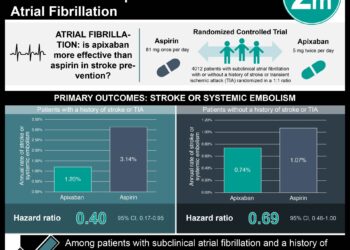De-escalating dual antiplatelet therapy may lower major bleeding risk following drug-eluting stent implantation
1. In this systematic review and meta-analysis, de-escalating dual antiplatelet therapy to ticagrelor monotherapy following implantation of a drug-eluting stent was associated with a lower major bleeding risk without increasing the rate of ischemic events.
2. Ticagrelor monotherapy was associated with an overall reduction in adverse clinical effects, but not with a significant change in all-cause mortality or death from cardiac causes.
Evidence Rating Level: 1 (Excellent)
Study Rundown: Management of patients with acute coronary syndrome (ACS) undergoing percutaneous coronary intervention involves dual antiplatelet therapy (DAPT) with aspirin and a P2Y12 inhibitor such as ticagrelor for 12 months. However, DAPT can increase the risk of bleeding complications, thus prompting examination of de-escalation strategies. While existing meta-analyses suggest that de-escalation may be effective, conclusions were limited by study heterogeneity, inconsistencies in the specific P2Y12 inhibitor used, and varied clinical end points. This study aimed to determine the efficacy and safety of de-escalation to ticagrelor compared with ticagrelor-based standard DAPT. A review of 3 randomized clinical trials showed that the rate of ischemic events did not differ significantly between ticagrelor monotherapy and standard DAPT, while the rate of bleeding was lower in the ticagrelor monotherapy group. These results were consistent when analyzing subgroups of patients with ST-segment elevation myocardial infarction (STEMI), non-STEMI (NSTEMI), and unstable angina. Patients who had undergone monotherapy had a lower overall rate of adverse clinical effects as well as a lower rate of significant bleeding. However, the rates of all-cause mortality and death from cardiac causes did not differ significantly. The generalizability of this study was limited by its exclusion of de-escalation strategies other than ticagrelor monotherapy; the fact that patients were from only two countries (South Korea and China); and a relatively short follow-up period. Nevertheless, these results suggested that de-escalating DAPT may reduce bleeding risk while maintaining a similar risk for ischemic events.
Click to read the study in AIM
In-Depth [systematic review and meta-analysis]: This systematic review aimed to synthesize the current knowledge surrounding the efficacy and safety of de-escalation to ticagrelor monotherapy compared with standard DAPT. Inclusion criteria were randomized clinical trials; enrollment of patients presenting with ACS who were undergoing DES implantation; and comparison between ≤ 3 months DAPT followed by ticagrelor monotherapy or continued DAPT for 12 months. Primary outcomes were ischemic events such as death, myocardial infarction, and stroke; and significant or fatal bleeding. A total of 3 studies were included, yielding a patient population of 9130, 4562 (50.0%) of whom were assigned to the de-escalation group and 4568 (50.0%) to the standard DAPT group. Patients had a mean age of 60.9 (standard deviation, 10.5) years and were 21.1% female. A similar percentage of patients were diagnosed with STEMI (34.3%), NSTEMI (33.1%), and unstable angina (32.6%). There was no significant difference in the rate of the primary ischemic end point between ticagrelor monotherapy and standard DAPT (1.7% vs. 2.1%; hazard ratio [HR], 0.85 [95% CI, 0.63 to 1.16]), while the rate of the primary bleeding end point was lower for ticagrelor monotherapy (0.8% vs. 2.5%; HR, 0.30 [95% CI, 0.21 to 0.45]). These effects were consistent across all prespecified subgroups, including age, sex, type of ACS, and multivessel disease. Net adverse clinical effects were less common among ticagrelor monotherapy patients compared with standard DAPT (2.3% vs. 4.2%; HR, 0.56 [95% CI, 0.44 to 0.72]). However, there was no significant difference between ticagrelor monotherapy and standard DAPT for the composite of death, non-procedural MI, stroke, stent thrombosis, or target vessel revascularization (2.8% vs. 3.5%; HR, 0.80 [95% CI, 0.63 to 1.03]), or for the composite of death from cardiac causes, non-procedural MI, or stroke (1.5% vs. 1.8%; HR, 0.87 [95% CI, 0.62 to 1.21]). Notably, ticagrelor monotherapy was associated with a lower rate of significant bleeding (0.7% vs. 2.4%; HR, 0.29 [95% CI, 0.19 to 0.43]). Overall, this study suggests that de-escalation to ticagrelor monotherapy may reduce the risk of bleeding while not significantly affecting the risk of ischemic events among patients with ACS post-DES implantation.
Image: PD
©2025 2 Minute Medicine, Inc. All rights reserved. No works may be reproduced without expressed written consent from 2 Minute Medicine, Inc. Inquire about licensing here. No article should be construed as medical advice and is not intended as such by the authors or by 2 Minute Medicine, Inc.






